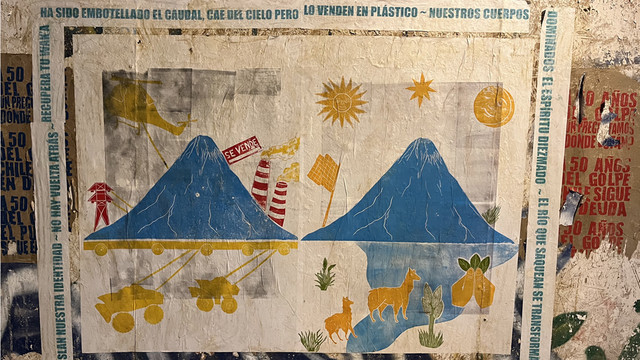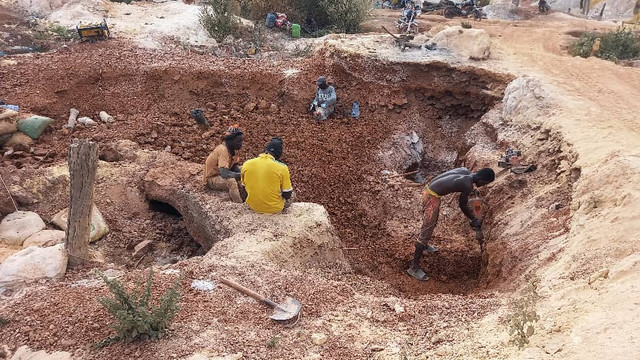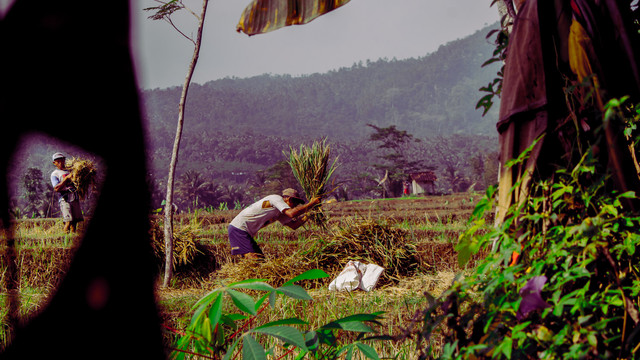Can mining dig rural women out of poverty in Ghana?
An IIED dialogue with small-scale mining communities discovered women see mining as a source of hope – but that their dreams are seldom realised.


Women including mining engineer Judith Akorfa Buaba (centre) employed at the Dakete mine, in Ghana (Photo: Copyright Gabriela Flores Zavala)
Walking within the artisanal and small-scale mining population in Tarkwa, one of Ghana's principal mining regions, it dawns on me that the local population has walked a long way to be where they are.
Many of them come from different backgrounds and professions from across the nation. IIED hosted an "action dialogue" in Ghana with people working in artisanal and small-scale mining (ASM), which included visits to artisanal mines to hear the views of miners. I was struck that their story is not of despair but rather that of hope and commitment to fighting poverty.
Most small-scale miners in Ghana are digging for gold or diamonds, with a small number involved in mining for industrial minerals.
Quite a number of women are part of the workforce. The women in Tarkwa often work in lower paid, less physical roles, working mostly as loaders (carrying bags of ore), cooks or providing services such as sewing and laundry.
Other women are engaged in hand sorting the ore and blending, particularly when manual sorting is preferred to mechanical means. Women also provide goods and service providers, including water supplies and other essentials.
These are less attractive and the least rewarding positions yet they often provide the only option for an unskilled labour force.
Why do women choose mining?
Ellene Amankwah (not her real name) trained as a tailor/seamstress in Takoradi three hours or so from Tarkwa. She had hoped to get employment and earn enough to support her elderly parents and six siblings. But when she finished her training, she found she could not earn enough to take care of herself and the family.
It was then that she decided to come to Tarkwa in order to get sufficient capital to buy her own equipment and possibly rent a shop in Takoradi.
It is three years now since she started to work within the artisanal and small-scale mining community in Tarkwa. Ellene has been involved as loader and water carrier, supporting different groups in the mining community. She earns only enough to feed herself, pay her rent and send a small amount home to her siblings.
The dream of earning enough to start her own business is still fresh in her mind. According to her, small-scale mining operations are not as lucrative as they were three years back when she arrived in Tarkwa. However she is not ready to give up yet. Artisanal and small-scale mining remain her only option.
This is a story told by many of the women we met during our four days learning and dialogue series in Tarkwa. It is the story of women who have powerful dreams of changing their lives and the lives of their community. It is a story of hope and inspiration rather than despair.
Several young girls that I met in Tarkwa said that they came to work in the mines in order to pay for their own and their siblings' school fees. They saw an opportunity in mining that does not exist for other similar economic activities.
Despite the dreams and motivations of these women, they are trapped in the poverty cycle associated with most informal economies. They seem to earn enough for their necessities but lack sufficient capital to move on.
Every new day for them brings hope of getting back to what they love most, but like most artisanal small-scale miners they rarely achieve this due to the due to the tough realities of working in this sector.
Can mining provide a way out for these women?
Despite the huge potential for lifting individuals out of poverty, this has not yet been achieved in Ghana or in the rest of world.
Individuals see mining as an engine and catalyst for moving onto something better, for 'socio economic development'. The sector needs to fulfill this potential for the lives of millions of women who are involved in the sector globally.
That is why IIED initiated the ASM action dialogue series to provide an opportunity to ask what went wrong for the sector, and how we can make it better. It is clear that if policymakers, industry and academia paid more attention to the sector, there could be happier stories to be documented from the field.
The land tenure system, a lack of financing and a lack of geoscientific information are some of the well elaborated challenges hindering the ASM community in Ghana. However as you move through the mines in Tarkwa you realise that more should done for our women to get out of poverty.
The lack of regulation and formalisation in the sector makes it difficult for small-scale mining to achieve its maximum potential. Poor technology, a lack of proper skills in mineral processing and low yields make it uneconomical. The absence of support systems including health, sanitation and environmental protection are also striking.
Fluctuating incomes in the mining sector mean that women need support, including programmes to teach them about business and being entrepreneurial to diversify their incomes.
Women's voices at the policy table should not be optional. They must be heard because only they can say what is needed to support their struggle.
That’s why this dialogue comes at the right time: it gives women miners' voices a space.
Amani Mhinda (amani.mhinda@hakimadini.org) is the executive director of Haki Madini, a Tanzanian NGO dedicated to support artisanal and small-scale mining communities. He is a member of IIED's advisory group on artisanal and small-scale mining.
Resources
IIED is supporting a process of sector reform on the issues affecting communities involved in artisanal and small-scale mining, including a number of gender issues. For more information, contact abbi.buxton@iied.org.



